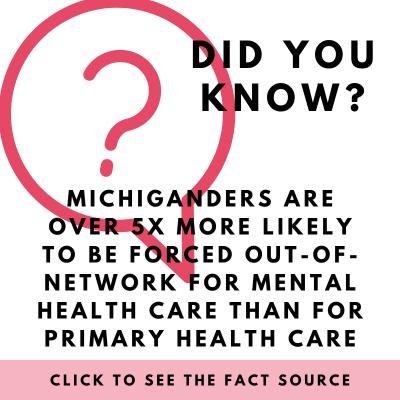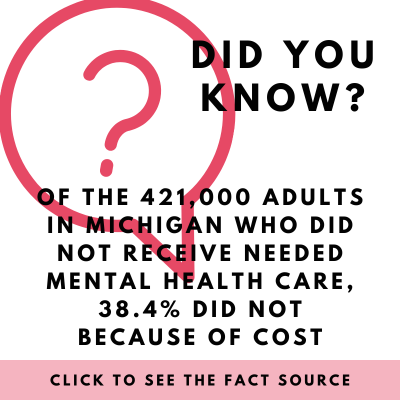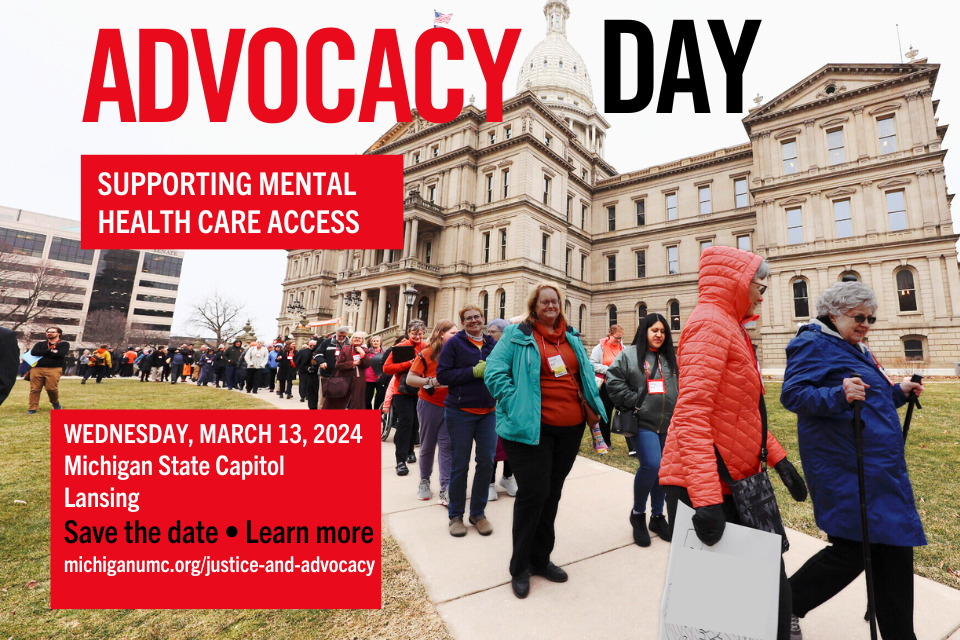Improving access to mental health care is the focus of this year’s Advocacy Day, which will occur on March 13 in Lansing at the State Capitol.
JAMES DEATON
Content Editor
Called a “Methodist miracle,” 350 Michigan United Methodists and friends came to Lansing last spring to meet with state legislators. People of deep Christian faith were moved to build relationships with lawmakers and urge them to pass common-sense gun safety laws.
Advocacy Day made a lasting impact. Michigan legislators passed 11 laws to improve public safety, reduce gun violence, and save lives. These laws will go into effect in three weeks.
Following this fantastic success, we will return to the State Capitol on Wednesday, March 13, for Advocacy Day 2024. This year’s topic touches every family in Michigan — mental illness.
Central United Methodist Church, directly across the street from the Capitol building, will again be our host for the day. Registration begins at 7:30 am, and the day’s events will conclude by 2 pm. (Click here to see the full schedule.) Register now and spread the word.
Did you know that over 1.4 million adults in Michigan have a mental health condition? Did you know that 57.8% of Michiganders aged 12 to 17 living with depression did not receive any care in the last year? Did you also know that many Michiganders do not receive needed mental health care because of cost or not having access to resources or professionals? (Click to read more startling statistics from the National Alliance on Mental Illness, NAMI.)
Those persons affected by these gaps in care and injustices within our current health care system need us to stand up for them and speak out. More must be done at the state legislative level to ensure budget alignment. More must be done to see that quality services are available to all, no matter who you are or what your income level is.
As United Methodists, we know we can do much more together than individually. At last year’s Advocacy Day, we proved it. So, join others in Lansing on March 13, and bring friends, and we’ll take action. We’ll meet with lawmakers and continue building bridges, pray and worship together, write letters, and stand together on the Capitol steps, among other activities.
We will have a visible public witness on behalf of our family members, friends, and neighbors who need affordable mental health care. By telling our personal stories and naming the challenges our loved ones have experienced, we’ll help to reduce the shame and stigma attached to mental illness.
Despite advances in medicine and a deeper understanding of the physiology of the human brain, mental illness is not treated the same way as other physical ailments or conditions. Mental illnesses are also feared in ways that other illnesses are not. There is societal shame for being honest and open about having mental illness, whether it’s depression, anxiety, dementia, or addiction. And there can be risks in seeking treatment. Time off from work can be scrutinized. Care is too costly, or insurance coverage is insufficient.
Some communities are placed at higher risk because society mistreats and marginalizes them. A survey from last year found that 41% of LGBTQ+ young people seriously considered attempting suicide in the past year, including roughly half of transgender and nonbinary youth. A recent study of mental health providers in southwest Michigan found significant racial disparities in access to mental health care for Black and Arab American adolescents compared to their white peers.
As Christians, we believe God desires the health and wholeness of every human being, for we are created by God and born to be in relationship with others. We also follow in the footsteps of Jesus, who ministered with love and compassion to all, especially those considered outcasts by society.

John Wesley, the founder of Methodism, taught that God cares for our overall well-being, and tending to our minds and bodies is just as important as tending to our souls. The United Methodist Church continues in that tradition today through its witness and message.
The Book of Discipline (2016), which outlines church law and doctrine, says, “No person deserves to be stigmatized because of mental illness. . . . Persons with mental illness and their families have a right to be treated with respect on the basis of common humanity and accurate information” (Social Principles, ¶162.X). We are all made in God’s image and possess dignity and belovedness, and absolutely nothing can separate us from God’s love (Genesis 1:27; Psalm 139:13-14; Romans 8:38-39).
The section on mental health in the Social Principles then moves from belief to action: “The United Methodist Church pledges to foster policies that promote compassion, advocate for access to care, and eradicate stigma within the Church and in communities” (¶162.X).
In The Book of Resolutions (2016), General Conference also calls all United Methodist congregations to become “Caring Communities” and respond to mental illness through advocacy.
In “Ministries in Mental Illness” (3033), a resolution that has been adopted by every General Conference since 1992, churches that work to become a “Caring Community” seek this goal among others: “Congregations not only advocate for specific individuals caught up in bureaucratic difficulties, but identify and speak out on issues affecting persons with mental illness and their families that are amenable to legislative remedy” (3303.2).

Advocacy Day 2024 will give United Methodists here in Michigan the opportunity to speak out and make good change happen alongside other people of faith. Together, we can build a more robust network of advocacy through legislative action and congregational care for those suffering from mental illness.
Last year’s Advocacy Day was a gift to 350 United Methodists and friends, providing education, training, and a well-organized model for advocacy. This was especially true for those who had never met with their representatives and senators face-to-face and voiced their policy concerns through heart-to-heart conversations.
Tabitha Metreger, a United Methodist who participated last year, expressed appreciation and hopefulness: “I am very grateful to the conference for organizing this Advocacy Day and making it easy for us to meet with our legislators. There is strength in numbers, and having others to go with gives me the courage to use my voice. I hope this is the start of a new era of advocacy in the Michigan Conference of The United Methodist Church.”
Lisa Wigent admitted to the change of heart and mind she experienced in Lansing: “There are so many things I will carry with me from Advocacy Day. I hoped to make an impact through my participation, but I did not expect to be so personally impacted by participating. As United Methodists regroup and reaffirm their values, I see a new Church emerging — a Church that speaks unapologetically of our shared humanity and challenges us to live out and promote our values.”
A team formed through the Michigan Conference Board of Justice is planning this year’s Advocacy Day. It is coordinated by Rev. Alice Townley and Rev. Michelle King, who co-led last year’s event. If you have questions, send an email to Advocacy-Day@michiganumc.org.

Advocacy Day is offered on a sliding scale. A fee of $30 per person is recommended and includes refreshments, lunch, and materials. Additional funds will be used for future Advocacy Days. When you register, you’ll also have an opportunity to support Samaritan Counseling Center of Southeastern Michigan, CCMM #3050, an EngageMI project that offers mental health support in several United Methodist churches in our conference.
Leading up to the March 13 event, a series of online webinars and trainings will prepare you for Advocacy Day. Register now to receive all communications and training notices related to this event.
-
- January 25: Advocacy 101: Let’s Talk about Power Webinar, 7 pm EST / 6 pm CST
- February 15: Lunch and Learn on Mental Health Advocacy, 12:15 pm EST/11:15 pm CST. (This online event has a separate registration link. Click here.)
- February 20: Training #1, “A Road Map,” with Tori Booker, Advocacy and Outreach Manager for Immigration Law and Justice Michigan, 7 pm EST / 6 pm CST
- February 26: Training #2, “Insights,” with State Representative Julie Rogers, Chair of House Health Policy Committee, and State Representative Felicia Brabec
More details on the day’s events will be shared in the coming days, especially ideas for what you can do to participate if you cannot be there in person. One thing you can do is make laminated butterflies to be used on Advocacy Day. Learn more on the event page.
Leaders within the Michigan Conference look forward to March 13 and another opportunity to put faith into action. Bishop David Bard expressed his excitement, “I am delighted that Michigan United Methodists will once again gather at the State Capitol for Advocacy Day. We are building on the tremendously successful day we had last year, where we made good connections with legislators, encouraging them to support sensible gun safety measures. This year, we will discuss how the state might enhance services for those struggling with mental health. This day is as important for continuing our relationships with our representatives as for sharing our perspectives on an issue.”
Last Updated on January 31, 2024




